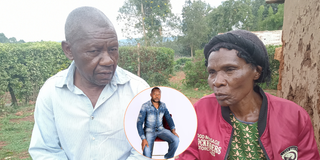Family’s anguish: Acute anaemia, hospital bills and no funds to airlift body from India

Parents of late Simon Wekesa - Tom Waswa and Leah Wekesa- who died while receiving cancer treatment in India.
What you need to know:
- Health specialists say thousands of Kenyans suffering from cancer die annually citing the excessive cost of private healthcare and the drawn-out period before scanning and commencement of treatment for the third leading cause of death in the country.
- Statistics from the Ministry of Health indicate that cancer accounts for seven percent of annual deaths forcing county governments to allocate funds to set up radiation treatment facilities.
When a family in Trans Nzoia County sought specialised treatment in India for their kin suffering from blood cancer following recommendations by specialists, there were high expectations of recovery.
The pursuit to have their son, Simon Wekesa, 35, who had been in and out of hospital since 2019 diagnosed with acute anaemia, saw the family from Chematich in Cherangany sell most of their valuables to raise air tickets apart from the Sh7.5 million required for a bone marrow transplant.
“It cost us over Sh1.5 million to periodically replace his blood before a specialist suggested that Simon undergo an allogeneic transplant. For this, he had to be airlifted to India, which was a major blow considering we are low-income earners,” Leah Wekesa, the mother, said.
The family with the support of the local church congregation managed to raise Sh400,000 and Simon left for India in January 2024.
Medical documents seen by Nation.Africa indicate that bone marrow transplant consultant Dr Shirshir Seth had suggested that Simon undergo an allogenic transplant, which needed a stem cell donor.
However, the treatment did not last long as Simon succumbed and passed away on March 4 while undergoing treatment at Indraprastha Apollo Hospital in India.
The family is now faced with the challenge of raising Sh2 million to have Simon’s body airlifted from India to their Kitale home for burial.
“It is devastating that my son finally died in a foreign country after spending all that I had to afford him the best possible treatment. I don’t know how I will accomplish the body airlift challenge in order to accord him a decent burial,” said Tom Wekesa, his father.
“We appeal to the government and well-wishers to save us from this agony,” David Wamalwa, a brother to the deceased, said.
The family and neighbours have been making daily contributions towards the body’s repatriation for burial.
“We are asking our leaders and the government to help us liaise with the Indian Embassy to give us time to raise money to clear the hospital bill and airlift the body home for burial,” Leonard Bett, a neighbour added.
Most cancer patients who cannot afford private healthcare prefer herbal treatments even as they wait in line for a turn at the radiation therapy in public hospitals.
According to health specialists, thousands of Kenyans suffering from cancer die annually citing the excessive cost of private healthcare and the drawn-out period before scanning and commencement of treatment for the third leading cause of death in the country.
“We are witnessing new cancer cases and a lot needs to be done in terms of prevention and research. We should not expect immediate gains,” said Dr Naftali Busakhala, an oncologist at Eldoret Hospital.
Statistics from the Ministry of Health indicate that cancer accounts for seven percent of annual deaths forcing county governments to allocate funds to set up radiation treatment facilities.
The Moi Teaching and Referral Hospital (MTRH) is grappling with a high number of cancer patients seeking treatment in the western Kenya region.
The facility has the state-of-the-art Chandaria Cancer and Chronic Disease Center, which offers both radiotherapy and chemotherapy. This unit can handle 500 patients, which is inadequate for the flood of patients from as far afield as Uganda, Rwanda and South Sudan.
It handles over 50 patients per day for both screening and diagnosis of cancer, more than 120 cases for chemotherapy weekly, 50 cases daily for radiotherapy and 15 cases weekly for cancer surgery.
Cancers prevalent among women are of the breast, cervix and reproductive tract malignancies. Among men, there is prostate cancer, cancer of the oesophagus, head and neck cancer, and gastrointestinal and colon cancers. Blood cancers are those linked to leukemia and lymphomas and affect all genders and cut across age groups.






